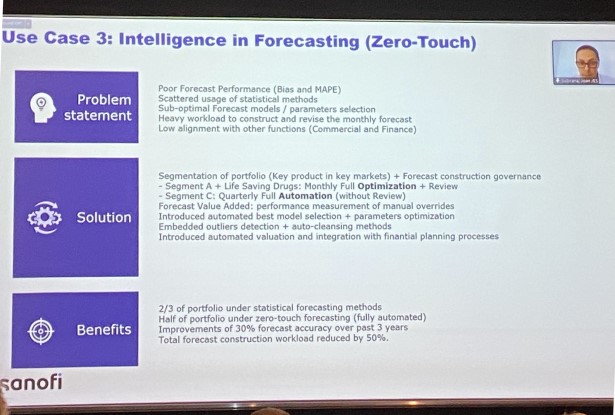After a three-year hiatus, LogiPharma Europe, the world’s leading pharmaceutical supply chain event, was back with a bang in Nice. There were approximately 1,000 attendees, the largest LogiPharma ever. Along with record attendance, this year’s event offered powerful insights from industry leaders who have accelerated transformation to meet evolving healthcare needs throughout the global pandemic. It was great to reconnect with former colleagues, make many new friends and learn about advancement in the industry. Here are three key takeaways from this year’s conference.
1) The need for sustainability and efficiency will drive innovation.
Waste accounts for twenty-five percent of U.S. healthcare spending, according to a panel hosted by Florence Noblot from DHL with Stephan Gotthardt from Teva, Bert Lemmens from Terumo, and Marrie Groeneveld from SkyCell. The group mapped out the challenges to becoming more sustainable in pharma, and I was surprised to learn that our industry generates 300 million tons of plastic waste every year. To increase sustainability, mature companies are focusing on scope 1 and 2 emissions, not only 3. Reshoring is seen also as a sustainability initiative to reduce transportation. But given the challenges of waste reduction, emissions are only one piece of the pie.
 I very much enjoyed a short talk by Joan Subirana from Sanofi where he showed how adopting concurrent planning can help to increase efficiencies across the supply chain, such as the company’s 52 percent reduction in risk of expiry. The company has also seen 68 percent less stockout exceptions and 12 percent better adherence to target coverage.
I very much enjoyed a short talk by Joan Subirana from Sanofi where he showed how adopting concurrent planning can help to increase efficiencies across the supply chain, such as the company’s 52 percent reduction in risk of expiry. The company has also seen 68 percent less stockout exceptions and 12 percent better adherence to target coverage.
These planning practices have increased efficiencies for the business and for planners. Two-thirds of Sanofi’s portfolio uses statistical forecasting methods and half of its portfolio has fully automated, no touch forecasting. This has halved planners’ forecasting workload and led to a 30 percent improvement in forecast accuracy over the last three years.
I also had the honor of hosting a panel with Maria Kounenaki from Bristol Myers Squibb, Antonio Tramontano from Novartis, and Avinash Gore from CSL Behring, where we discussed how each company's supply chain is using technologies and processes like concurrent planning to drive decision-making. For many, that includes managing their ERP footprint, which could be as many as 17 instances of SAP as in the case of Novartis.

2) The “Internet of Supply Chain” (IoSC) will optimize the entire ecosystem.
The last keynote on day 1 was about Opus, an exciting new collaboration platform that will extend planning to partners, CMOs, suppliers and customers. Shabbir Dahod, President and CEO, TraceLink calls this platform the Internet of Supply Chain, or IoSC. Like the Internet of Things (IoT), it promises to link digital processes to allow collaboration across and optimization of the entire ecosystem. Dahod announced TraceLink’s partnership with Kinaxis as the technology that is able to leverage this vast ecosystem. The partnership will enable agile collaboration and exception management between manufacturers and their suppliers.
3) Blockchain utilization has the potential to transform the industry.
And last but not at all least, a major theme of the week was applying blockchain technology to transform pharma supply chain and other parts of the industry. There were a number of sessions, but I was only able to attend the keynote on day 3 with Brian Thornley from MSD and the subsequent panel moderated by Daniel Fritz from Novartis with Paolo Migliari from MSD, Jan Wortmann from Bayer and Rene Kronenburg from Abbvie. Both sessions were eye opening on what the possibilities are and what these companies are doing to leverage blockchain to improve things like fraud reduction and product traceability. They also discussed the pharma consortium PharmaLedger and the collaboration across the industry that is mission critical to enable blockchain utilization across the ecosystem.
Preparation for the challenges ahead
The years to come will continue to bring major advancements to pharma supply chains, particularly as the industry meets rapidly changing healthcare and supply chain challenges. If you’re looking to stay ahead of each shift, the LogiPharma Playbook 2022 is the ultimate companion to the conference, providing additional insights on end-to-end supply chain planning and the technologies that will power the future.





